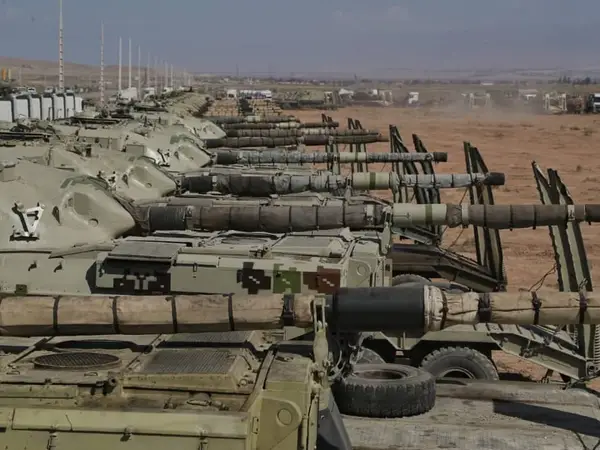The likelihood of war between Iran and Azerbaijan has increased with escalation between Yerevan and Baku, but pundits in Tehran are optimistic war can be avoided.
Tensions have been high between Iran and Azerbaijan since November 2022 when both sides accused each other of engaging in terrorism and espionage. Iran has also suggested Azerbaijani involvement in the October 26 attack in Shiraz claimed by the Islamic State group (Isis-Daesh).
While some pundits allege that Tehran is awaiting a wrong move by Azerbaijan to attack the country, international relations expert Ali Bigdeli in Tehran told Rouydad 24 news website that the possibility of military conflict between Tehran and Baku is “nil” while criticizing Russia for “silence” over the situation given its close relations with both.
Tehran has also accused Baku of harboring Israeli intelligence and military elements that plan to use its territory in a possible attack against Iran’s nuclear facilities. “The [Azerbaijani] soil is a base for Israel from where it can threaten Iran's security,” Bigdeli said.
He pointed out that Israel has succeeded in “infiltrating” not only Azerbaijan but also other countries including Iran's neighbor Turkmenistan and Central Asian states. At the same time, Shia Iran's attempts to create “centers of resistance” in Azerbaijan where, unlike its Sunni rulers, 60 percent of the population are Shiites irritates Baku.
Around a quarter of Iran’s population is Azari, with analysts and activists disagreeing over the closeness of their cultural-linguistic links to their neighbors to the north.
Hamed Khosroshahi, a Caucasus region researcher in Tehran, expressed a similar view about the possibility of war between Tehran and Baku in an interview with Donya-ye Eghtesad daily. The possibility of war is near zero because both Iran and Azerbaijan are aware that that they have ties that cannot be altered.
Azerbaijan’s Nakhichevan enclave bordering Iran needs to procure gas and oil through Iran on the one hand and Iran's dependence on transit to Russia through Azerbaijan, are important factors he said. “The two sides know that they should not allow tensions rise beyond a certain level.”
While saying that the two countries are currently “appraising” their military power, Vali Khalaji, Caucasus region and Central Asia analyst in Tehran, said escalation of tensions would not necessarily end in war and could instead result in “relaxation of tensions” given factors including interdependent transit needs.
Current tensions are closely tied to the recent escalation between Azerbaijan and Armenia. Secretary of the Security Council of Armenia, Armen Grigoryan on Friday accused Azerbaijan of preparing for military escalation. Baku vehemently denies the charge while accusing Yerevan of violating the Prague and Sochi agreements.
A transit corridor through Syunik province of Armenia which Azerbaijan is demanding to secure access to its Nakhichevan Autonomous region without Armenian checkpoints will disconnect Iran from its de facto ally and trade partner Armenia.
Russia’s Minister of Foreign Affairs Sergey Lavrov met with Armenian Minister of Foreign Affairs Ararat Mirzoyan in Samarkand, Uzbekistan, Friday and among other topics, according to Armen Press, discussed “unblocking of all economic and transport links in the region” and the Nagorno Karabakh issue.
Azerbaijan closed its embassy in Tehran afteran armed attack on Azerbaijan’s embassy in Tehran in January and earlier this month expelled four Iranian diplomats over what it called “provocative actions” which may refer to Iran's several military drills along the border with Azerbaijan in the past year including the latest in October.
Fresh skirmishes at Armenian-Azerbaijani border earlier this week left a total of seven deaths from both sides in one day around the contested Nagarno-Karabakh region. The Islamic Republic says it is neutral in the conflict, but it apparently backs its de facto ally Armenia and has warned it would not tolerate changes to international borders.
